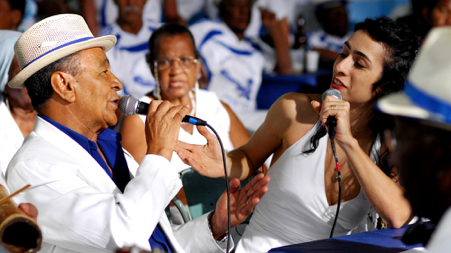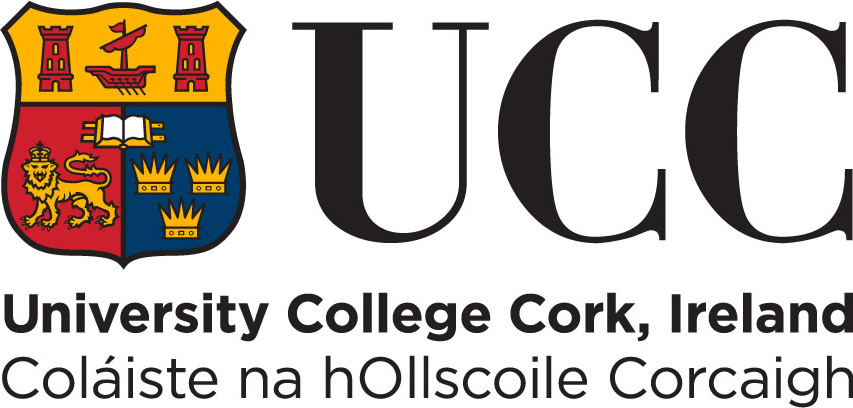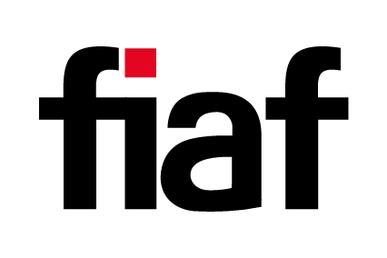Capturing the Soul of the Suburb: An Interview with Lula Buarque de Hollanda
Tamara Courage and Albert Elduque

Figure 1: Monarco and Marisa Monte in O mistério do samba (The Mystery of Samba,
Lula Buarque de Hollanda and Carolina Jabor, 2008). Conspiração Filmes. Screenshot.
In his conversation with us, Lula Buarque de Hollanda analyses Conspiração’s precursor role in the recent wave of music documentaries in Brazil and reflects on the production process of O mistério do samba (The Mystery of Samba, Lula Buarque de Hollanda and Carolina Jabor, 2008). The interview was held telephonically on 3 October 2018.
Lula Buarque de Hollanda (Rio de Janeiro, 1963) is a filmmaker and producer. After completing a BA in Anthropology at the Federal University of Rio de Janeiro and an MA in Cinema from New York University, he founded the film production company Conspiração in 1991 with Claudio Torres, José Henrique Fonseca and Arthur Fontes. Today, Conspiração is one of the most important production companies in Brazil, working in a wide range of areas that include cinema, advertisement, television, branding and music videos.
Since the 1990s, Brazilian music has occupied a prominent place within Conspiração, with productions that include the documentary films Viva São João! (Andrucha Waddington, 2002) and Maria Bethânia: Pedrinha de Aruanda (Maria Bethânia: Aruanda’s Pebble, Andrucha Waddington, 2007), successful singer biopics such as Dois filhos de Francisco: A história de Zezé di Camargo & Luciano (Two Sons of Francisco, Breno Silveira, 2005) and Gonzaga: De pai pra filho (Gonzaga: From Father to Son, Breno Silveira, 2012), music videos and TV specials. Overall, Conspiração has received 32 MTV Brasil awards. O mistério do samba, which Lula codirected with Carolina Jabor, is a remarkable documentary film produced by the company. It features the band Velha Guarda da Portela (Portela’s Old Guard) during their album recording of Tudo azul (All Blue, 2000). The film was screened at Cannes Film Festival and was awarded the 2009 Best Documentary Prize by the Brazilian Film Academy.
Other works by Lula include the documentary films Pierre Fatumbi Verger: Mensageiro entre dois mundos (Pierre Fatumbi Verger: Messenger Between Two Worlds, 2000) and O muro (The Wall, 2017), and fictional features Casseta & Planeta: A Taça do Mundo é nossa (Casseta & Planeta: The World Cup is Ours, 2003) and O vendedor de passados (The Book of Chameleons, 2015). In recent years, he has been involved in audiovisual projects related to visual arts, such as the collective work Destricted.br (2011). He is also founder of Espiral, a company which produces ventures involving music, cinema and contemporary art.
COURAGE & ELDUQUE: In the 2000s, the Brazilian music documentary scene boomed with big successes including Nelson Freire (João Moreira Salles, 2003) and Vinicius (Miguel Faria Jr., 2005). However, from the 1990s and with your film company Conspiração, you had already produced a lot of films about singers and song writers. Can you explain the company’s early stages and how it evolved over the years?
HOLLANDA: I completed my master’s degree at New York University in 1989–1990, then returned to Brazil and founded Conspiração with my colleagues Claudio Torres, José Henrique Fonseca and Arthur Fontes. During this period, the Brazilian music industry was much wealthier than the film industry, so it was not by chance that MTV Brasil had just been launched [1990]. While acquiring a budget to produce fiction films was extremely challenging, music recording companies had plenty of money and they agreed to fund our projects on important Brazilian singers. We produced a lot of films, including Gilberto Gil: Tempo rei (Gilberto Gil: Royal Time, 1996), which I codirected with Breno Silveira and Andrucha Waddington and Milton Nascimento: A sede do peixe (Milton Nascimento: The Thirst of the Fish, 1998), which I codirected with Carolina Jabor. We focused on both the masters and younger artists from our own generation such as Marisa Monte and Paralamas do Sucesso who were also our friends. I stopped doing those kinds of films in 2004 or 2005 because I wanted to explore new territories, including other types of documentaries, fiction films, series… Today, both the music and film industries have changed a lot. Recording companies don’t make as much money as they used to and profit margins from copyrights have decreased significantly. On the other hand, making movies is much easier and cheaper because digital cameras allow you to produce a nice product at a relatively small financial cost.
COURAGE & ELDUQUE: Why were you interested in producing films about music?
HOLLANDA: Apart from the funding reasons that I mentioned, I have always been concerned with issues related to memory. In the 1990s, my colleagues and I realised that there were no quality products about music in the Brazilian audiovisual market. Up to that point, you had the conventional formulas of TV Globo and its show Fantástico (Fantastic, Sobrinho, 1973–), which was rather rudimentary. In Conspiração we had in mind the idea of bringing film language into our works on music, even if they were produced for television. From this, a sophisticated production pattern emerged and became a model for many filmmakers. In fact, our company was somehow a promoter of the 2000s wave (which you mentioned before).
COURAGE & ELDUQUE: The music documentary O mistério do samba which you codirected with Carolina Jabor was released in cinemas in 2008, and so is undoubtedly part of that wave. We think it is a beautiful piece of work about Velha Guarda da Portela with the guidance of MPB [1] and pop-rock singer Marisa Monte. How was the film conceived?
HOLLANDA: In fact, Marisa Monte is my sister-in-law and I was Marisa’s first manager, working with her long before she was the famous Marisa Monte that everybody in Brazil now knows. I produced her first TV special programme, which was directed by Nelson Motta and Walter Salles and released on TV Manchete in 1988. Marisa was perhaps the first Brazilian singer to have a TV special within a national network before having released an album! That was filmed in 16mm and I already had concerns about achieving a sophisticated production style. After that, I directed other special TV programmes with Marisa, such as Marisa Monte: Mais (Marisa Monte: More, together with Arthur Fontes, 1992), Marisa Monte: Barulhinho bom: Uma viagem musical (Marisa Monte: Nice Noise: A Musical Journey, together with Claudio Torres, 1997) and Marisa Monte: Memórias, crônicas e declarações de amor (Marisa Monte: Memories, Chronicles and Declarations of Love, together with Claudio Torres, 2001). Each of these programmes was devoted to their respective albums, but we tried to infuse the language of documentary into the TV music specials and considered them to be almost like films. We created situations apart from the show because we didn’t want the films to be simply a concert recording. For example, in Barulhinho bom you can see Marisa composing a song with Arnaldo Antunes and Carlinhos Brown, long before they formed their band Tribalistas. We wanted to delve deeper into the soul of the artist and her poetic discourse.
Regarding O mistério do samba, the first thing to consider is that both Marisa and her father, Carlos Monte, have always been in contact with Velha Guarda da Portela. He was the association’s cultural director in the 1970s and in 2001 he coauthored the book A Velha Guarda da Portela (Portela’s Old Guard) with João Baptista M. Vargens. Marisa followed her father’s steps in this approach to Portela and in the 1990s started researching songs by the band’s members which had never been professionally recorded or broadcasted. The findings were put together in Velha Guarda’s album Tudo azul, which was released in 2000 and became a public and critical success. The band hadn’t been relevant in the music scene for a long time so Marisa’s public fame and charisma helped reinvigorate the band’s visibility to the media. I filmed the recording of the album and once it was released I wanted to keep going. As I was involved in many projects at that time, I called my colleague Carolina Jabor to codirect with me. All the filming was done on 16mm, which was very expensive, and it took us around eight years to raise the necessary funding.
COURAGE & ELDUQUE: You were talking about memory before, and it is indeed a key topic in the film. It is presented in various ways: Argemiro shows his notebook with handwritten lyrics, Marisa opens a trunk with cassettes containing Manacéa’s home recordings, Casquinha sings a non-recorded song…
HOLLANDA: When we started to film, old band members including Argemiro do Patrocínio and Jair do Cavaquinho were still alive, and there were valuable stories about Velha Guarda da Portela to be told. We aimed to find pieces of personal memory regarding the song writers’ lives and creative processes in the slums. For this reason, the film is somehow synchronised with Marisa’s project because it aims to portray a generation who were saying farewell. That generation, which was reaching the end of a life circle, was prolific in terms of music production and represented a lifestyle which doesn’t exist anymore: the peaceful, friendly life in the slums, with no urban violence, in which people used to meet together to sing. Many characters from the film died soon after, so it seemed to be the right moment to do that. Our main concern was to capture the soul of the suburb.
COURAGE & ELDUQUE: The film also features Paulinho da Viola, who appears on-screen talking with Marisa about Velha Guarda.
HOLLANDA: Paulinho da Viola was in fact the creator of the concept Velha Guarda back in the 1970s. At that time, he realised that there was a whole generation of samba songwriters whose songs had always been restricted to their community and had never been commercially released. Those people were aging, and the memory of their songs would soon be lost. Joining together in a music band allowed them to earn money from their music, as well as strengthen their identity. In the film, Marisa takes over from Paulinho da Viola, this task of rescuing music heritage through community work.COURAGE & ELDUQUE: Indeed, Marisa has a very important narrative role in the film, and she is no doubt the mediator between the film and Portela. In fact, this mediator between nonprofessional artists and the general public is a typical figure in Brazilian music documentaries, the most significant case being Paulinho da Viola as a narrator in Leon Hirszman’s Partido alto (1976–1982), which also features Velha Guarda da Portela.[2]
HOLLANDA: The interesting thing about Marisa’s mediation here is that she was the producer of the album Tudo azul, so she invested her own money in the recording, which took place in her own studio. She lent her fame and prestige to Velha Guarda da Portela and helped to restructure it as an institution so that its members could have visibility as artists and survive financially with their music. Then she became one of the producers of the documentary, contributing enormously to its public visibility. The film also features Zeca Pagodinho, a phenomenally successful Brazilian singer who has a strong relationship with Portela. For his albums, he always includes one or two songs by the Velha Guarda members. During the time of Tudo azul’s album release, having a track in an album by Zeca Pagodinho meant a large paycheque because he was highly successful in the music market and copyright provided songwriters with a large sum of money.
COURAGE & ELDUQUE: To what extent did Marisa contribute to the documentary script and planning? Regarding the scenes in which new songs are discovered, are they recreations of Marisa’s research?
HOLLANDA: It was mostly Carolina Jabor and I who organised that, and Marisa in turn, shared her views with us. It was a nice partnership because each person gave their best. For example, I love the scene in which Marisa visits Manacéa’s daughter’s house, and she opens a trunk and discovers new song lyrics and tracks. Scenes like that were not recreations. We arranged the meetings and asked people to have their old notebooks and cassettes prepared. We didn’t know what we would find, but Marisa had done that kind of research systematically for the album Tudo azul, and we were certain that new material would be discovered. In fact, all the singers from Velha Guarda have unpublished lyrics or amateur recordings at home.
COURAGE & ELDUQUE: Do you know of any film that predates O mistério do samba?
HOLLANDA: Not really, because you can’t find many films on samba before the 2000s. There are some works from the 1970s, such as Hirszman’s Partido alto and Saravah (1972) by French filmmaker Pierre Barouh, featuring Paulinho da Viola and Maria Bethânia, among others. In fact, we did a large amount of archival image research and discovered very little, to the extent that, if I’m not wrong, the only archival images in the film are from a 1950s film by the Atlântida film company, which features a parade in Paquetá.
COURAGE & ELDUQUE: “O mistério do samba” is also the title of an important book by Hermano Vianna. Why did you use it for your documentary?
HOLLANDA: We had discussed the title many times but struggled to find a solution. I have known Hermano Vianna for a long time, and my mother, Heloísa Buarque de Hollanda, who is a very remarkable literature scholar in Brazil, had originally suggested the title “O mistério do samba” for his book. It explains the history of the birth of samba at the beginning of the twentieth century, and I very much like it. Even if the film is focused on a different topic, the title somehow fits with the research that Carolina and I aimed to portray: to understand what inspired songwriting and where the inspiration to produce poetry came from. This was the mystery of samba for us. Hermano of course agreed with me to use this title.COURAGE & ELDUQUE: Do you think Brazilian music documentaries are produced for Brazilians or for foreigners?
HOLLANDA: Here Dostoevsky comes to mind: first you must talk with your own people. In fact, you never know whether your film will tour other countries or not. O mistério do samba was selected for a small section at Cannes Film Festival. A very similar film, Wim Wenders’s Buena Vista Social Club (1999), travelled much more extensively and was an international phenomenon. I hadn’t yet seen it when I finished O mistério do samba. They were both produced at the same time and had the same aim: to record a generation of musicians that was nearing the end of its life cycle.
COURAGE & ELDUQUE: Do you believe the Brazilian music documentary wave is over or will it continue in the future?
HOLLANDA: I think it will continue. A documentary on Clara Nunes was just released, and now I am preparing a film about Gilberto Gil which will mostly consist of archival images. It is called Meu caminho pelo mundo (My Way Across the World) and it is produced for Canal Curta, a Brazilian network very much linked to artistic products.[3] I am currently working on locating images from the 1970s and 80s, when Gil released albums such as Refazenda (1975) and Refavela (1977). My model for this is Nelson Pereira dos Santos and Dora Jobim’s A música segundo Tom Jobim (The Music According to Antônio Carlos Jobim, 2012), which is amazing. I think this kind of work will continue to be produced because Brazilian music is very important in my country, in a sense that we feel indebted to our masters and pay homage to them. We will always discover new hidden treasures.
Notes
[1] Música Popular Brasileira (Brazilian Popular Music).
[2] The concept of cultural mediator in the history of samba is explored in Hermano Vianna’s O mistério do samba [The Mystery of Samba] and used by Guilherme Carréra to analyse Lula Buarque de Hollanda and Carolina Jabor’s film.
[3] The film was released by Canal Curta on December 2019 with the title Gilberto Gil: Antologia Vol. 1 (Gilberto Gil: Anthology Vol. 1). According to press records, the film features songs from 1966 to 1983 which are presented in full-length clips from when the tracks were released. Gil, who watches these records in a studio with no prior information, shares his memories impromptu and provides detailed insights into the creative process. A second volume for this anthology has not yet been defined. See Peixoto.
References
1. Buena Vista Social Club. Directed by Wim Wenders, Road Movies Filmproduktion, 1999.
2. Carréra, Guilherme. “Da Portela para a Mangueira: Um passeio pela mediação nos documentários O mistério do samba e O samba que mora em mim” [“From Portela to Mangueira: A Walk Across the Mediation in the Documentaries The Mystery of Samba and The Samba within Me”]. Rebeca – Revista Brasileira de Estudos de Cinema e Audiovisual, vol. 5, no. 2, July–Dec. 2016, pp. 1–24. https://doi.org/10.22475/rebeca.v5n2.217.
3. Casseta & Planeta: A Taça do Mundo é nossa [Casseta & Planeta: The World Cup is Ours]. Directed by Lula Buarque de Hollanda, Conspiração Filmes, 2003.
4. Conspiração Filmes. www.conspiracao.com.br. Accessed 1 May 2020.5. Destricted.br. Directed by Lula Buarque de Hollanda, Adriana Varejão, et al., Espiral, 2011.
6. Dois filhos de Francisco: A história de Zezé di Camargo & Luciano [Two Sons of Francisco]. Directed by Breno Silveira, Conspiração Filmes, 2005.
7. Gil, Gilberto. Refavela. Warner Music, 1977.
8. ---. Refazenda. Warner Music, 1975.
9. Gilberto Gil: Antologia Vol. 1 [Gilberto Gil: Anthology Vol. 1]. Directed by Lula Buarque de Hollanda, Canal Curta, 2019.
10. Gilberto Gil: Tempo rei [Gilberto Gil: Royal Time]. Directed by Lula Buarque de Hollanda, Breno Silveira, and Andrucha Waddington, Conspiração Filmes, 1996.
11. Gonzaga: De pai pra filho [Gonzaga: From Father to Son]. Directed byBreno Silveira, Conspiração Filmes, 2012.
12. Lula Buarque de Hollanda Website. www.lulabuarque.com.br. Accessed 1 May 2020.
13. Maria Bethânia: Pedrinha de Aruanda [Maria Bethânia: Aruanda’s Pebble]. Directed by Andrucha Waddington, Conspiração Filmes, 2007.
14. Marisa Monte. Directed by Nelson Motta and Walter Salles, TV Manchete, 1988.
15. Marisa Monte: Barulhinho bom: Uma viagem musical [Marisa Monte: Nice Noise: A Musical Journey]. Directed by Lula Buarque de Hollanda and Claudio Torres, Conspiração Filmes, 1997.
16. Marisa Monte: Mais [Marisa Monte: More]. Directed by Lula Buarque de Hollanda and Arthur Fontes, Conspiração Filmes, 1992.17. Marisa Monte: Memórias, crônicas e declarações de amor [Marisa Monte: Memories, Chronicles and Declarations of Love]. Directed by Lula Buarque de Hollanda andClaudio Torres, Conspiração Filmes, 2001.
18. Milton Nascimento: A sede do peixe [Milton Nascimento: The Thirst of the Fish]. Directed by Lula Buarque de Hollanda and Carolina Jabor, Conspiração Filmes, 1998.
19. O mistério do samba [The Mystery of Samba]. Directed by Lula Buarque de Hollanda and Carolina Jabor, Conspiração Filmes, 2008.
20. O muro [The Wall]. Directed by Lula Buarque de Hollanda, Espiral, 2017.
21. A música segundo Tom Jobim [The Music According to Antônio Carlos Jobim]. Directed by Nelson Pereira dos Santos and Dora Jobim, Natura, Regina Filmes, 2012.
22. Nelson Freire. Directed by João Moreira Salles, VideoFilmes, 2003.
23. Partido alto. Directed by Leon Hirszman, Embrafilme, 1976–1982.
24. Peixoto, Marina. “Curta! lança documentário em que Gilberto Gil comenta a propria obra” [“Curta! Releases a Documentary in which Gilberto Gil Talks about His Own Work”]. Estado de Minas, 23 Dec. 2019, https://www.em.com.br/app/noticia/cultura/2019/12/23/interna_cultura,1110080/curta-lanca-documentario-em-que-gilberto-gil-comenta-a-propria-obra.shtml.
25. Pierre Fatumbi Verger: Mensageiro entre dois mundos [Pierre Fatumbi Verger: Messenger Between Two Worlds]. Directed by Lula Buarque de Hollanda, Conspiração Filmes, 2000.
26. Saravah. Directed by Pierre Barouh, Éditions Saravah, 1972.
27. Sobrinho, José Bonifácio de Oliveira, creator. Fantástico [Fantastic]. Rede Globo, 1973–.
28. Vargens, João Baptista M., and Carlos Monte. A Velha Guarda da Portela [Portela’s Old Guard]. Manati, 2001.
29. Velha Guarda da Portela. Tudo azul [All Blue]. Phonomotor Records, 2000.
30. O vendedor de passados [The Book of Chameleons]. Directed by Lula Buarque de Hollanda, Conspiração Filmes, 2015.
31. Vianna, Hermano. O mistério do samba [The Mystery of Samba]. Jorge Zahar / UFRJ, 1995.
32. Vinicius. Directed by Miguel Faria Jr., 1001 Filmes, 2005.
33. Viva São João! Directed by Andrucha Waddington,Conspiração Filmes, 2002.
Suggested CitationHollanda, Lula Buarque de. “Capturing the Soul of the Suburb: An Interview with Lula Buarque de Hollanda.” Interview conducted by Tamara Courage and Albert Elduque. Alphaville: Journal of Film and Screen Media, no. 19, 2020, pp. 146–153, https://doi.org/10.33178/alpha.19.12.
Tamara Courage recently completed a postdoc at the University of Reading for the project Towards an Intermedial History of Brazilian Cinema: Exploring Intermediality as a Historiographic Method. Here, she expanded on the notion of intermediality in world cinema by investigating how it is used as a strategic tool in contemporary Chinese independent cinema to highlight issues regarding marginalised citizens who have been impacted by major socioeconomic transformations since the death of Communist leader Mao Zedong. Her current research interests examine the filmmaker’s role in imagining and representing realities for the historically peripheral subject through diverse and original modes of interventions that include performance, self-portraits, re-enactment and participatory methods.
Albert Elduque has recently completed a postdoc at the University of Reading, where he was part of the project Towards an Intermedial History of Brazilian Cinema: Exploring Intermediality as a Historiographic Method. His PhD dissertation, presented in Pompeu Fabra University (Barcelona) in 2014, dealt with the concepts of hunger, consumption and vomit in modern political cinema. His current research is on contemporary Brazilian films on music, focusing on the representation of the musical traditions of the country in recent fictions and documentaries. He is coeditor of the journal Comparative Cinema, published by Pompeu Fabra University.









